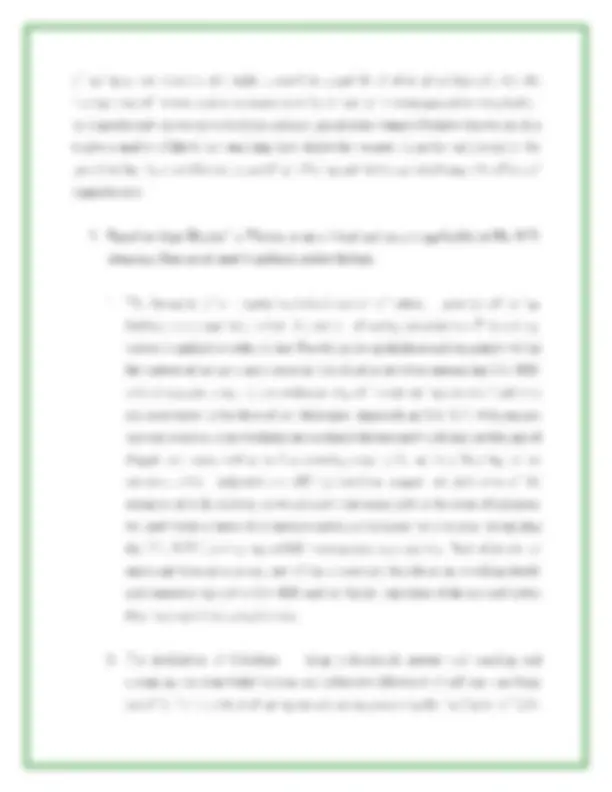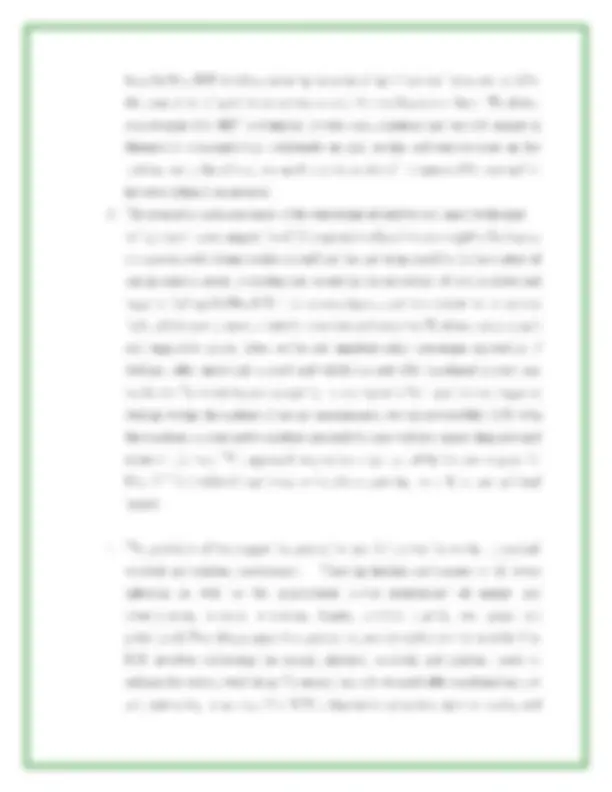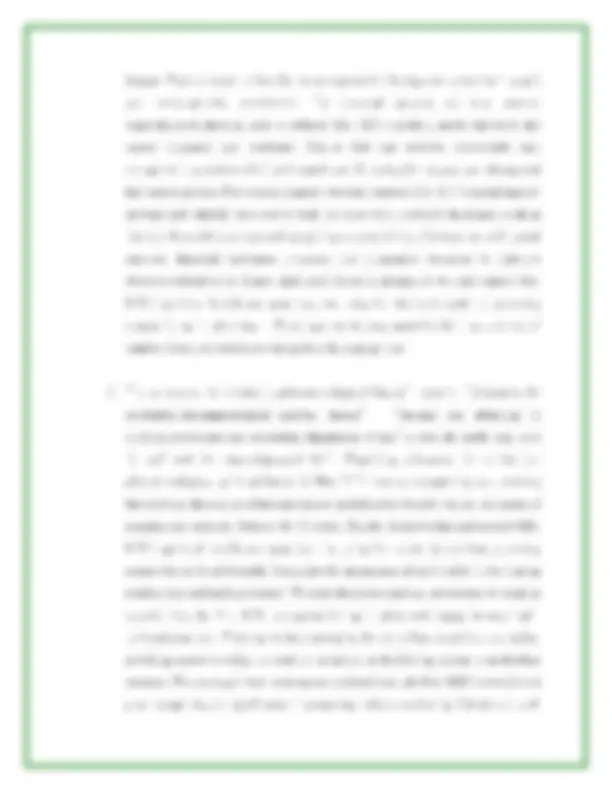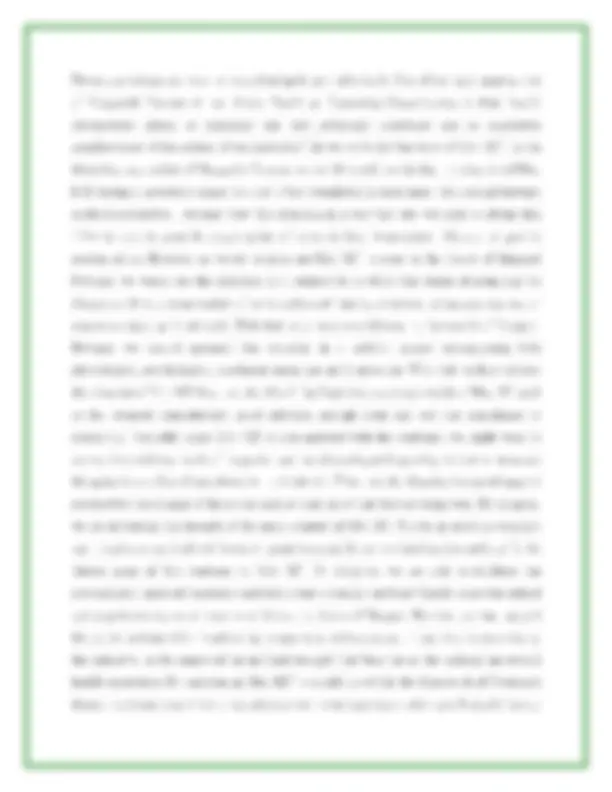







Study with the several resources on Docsity

Earn points by helping other students or get them with a premium plan


Prepare for your exams
Study with the several resources on Docsity

Earn points to download
Earn points by helping other students or get them with a premium plan
Community
Ask the community for help and clear up your study doubts
Discover the best universities in your country according to Docsity users
Free resources
Download our free guides on studying techniques, anxiety management strategies, and thesis advice from Docsity tutors
A nursing case study of mrs. M.d., a 60-year-old diagnosed with stage iv uterine carcinoma. it explores the application of madeleine leininger's theory of transcultural nursing and jean watson's theory of human caring to guide nursing interventions. The case study analyzes cultural care preservation, accommodation, and repatterning, and discusses five clinical caritas factors relevant to mrs. M.d.'s situation, including building trust, promoting positive orientation, and respecting client control. it also examines how these theories inform the development of a comprehensive care plan that respects the patient's cultural beliefs and values.
Typology: Exams
1 / 9

This page cannot be seen from the preview
Don't miss anything!






Nursing 201A Midterm Examination
DUA AU UU UU UU UNIVERSITY OF CEBU = MAIN CAMPUS GRADUATE SCHOOL March 16, 2025 Name: __ Rating: General Instruction: Please DISCUSS COMPREHENSIVELY the answers on the following items: Siluation: Mrs. M.D., a 60 ycar old widow with scven (7) siblings was admiltcd at Y hospital duc to bloody vaginal discharge 5 moths PTA. This was accompanied by abdominal discomfort and pain. She sought consultation with her gynecologist and was referred to oncologist for further management, and then biopsy revealed uterine carcinoma stage III. Surgery was recommended, radical hysterectomy and bowel resection were performed. Diagnosis was stage IV uterine carcinoma with metastasis to small intestine. Patient exhibited depressive symptoms like crying, despair, refusal to cooperate in the treatment regimen and worries over survival rate, family’ s financial resources and restoration of self care capabilities. The siblings are all working and taking turns in providing care. Possible discharge is one of the plans with continuous home treatment including possibility of chemotherapy sessions. Mrs. M.D. expressed to resort to herbal medicines and preparations and all vegetables and fruit diet, absolutely no pork and pork products. She desires to continue attending masses as source of spiritual strength. IUVUVUVUUUVUYUYUUUVUYUVUVUVUVUVUVUNUUYVUYVUVUNYVUVUYUVUVUYUYYVUVUYUUYUUYVUVVNYVYYVYVUVYYYVYYVUYYVUVYVUVVYYY DUA AU UU UU UU Questions: 1. As postulated by M. Leininger, which mode of nursing care decisions/actions (cultural care preservation, cultural care accommodation or cultural care re- pattering) are applicable to Mrs. M.D. As anurse-clinician, I am able to see a lot of cancer patients in my experience. We all know that. canccr is a curable in ils carly slage when il is carly detecled. As cancer progress and reach ils full blown stage (stage 4) we will be able to note that patient already have very poor prognosis and is experiencing dovastaling signs and symptoms already. In ine wilh Madeleine Leininger theory of transcultural nursing, the most applicable mode of nursing care decision is cultural care preservation. Under this theory, its concept is to include those assistive, supporting, facilitative or enabling professional actions and decisions that help people of a particular culture to retain and or preserve relevant values so that they can maintain their wellbeing, recover illness or facc handicaps and/or death. With that as we try 1a embed il in the situation we would be able to consider that with regard to the situation of Mrs. M.D. stage IV uterine carcinoma with mc to small intestine is alrcady an advance stage. With poor prognosis, the only thing that we could do is to assist the patient for a painless and good quality of life in her remaining days. Resorling Lo unconventional therapics such as herbal medicine could be a values thal sho learned from her ancestors or has been inculcated in her culture. This goes the same with allowing her Lo gain spiritual strongih by allowing her lo attend masses with no rosiriclions. Allowing it and facilitating it will somewhat give her the notion that we are respecting her decision and facilitating patient’ s autonomy. Personally, with my experience, these types of patients with a full blown carcinoma with metaslasis, oping with conventional therapy such as chemolthcrapy, radiation and surgical procedure, this only gives an extra burden the patient physiologically. The conventional therapy with il” side effects slowly destroy the palicnts bady. th her age thal comes with higher IUVUVUVUUUVUYUYUUUVUYUVUVUVUVUVUVUNUUYVUYVUVUNYVUVUYUVUVUYUYYVUVUYUUYUUYVUVVNYVYYVYVUVYYYVYYVUYYVUVYVUVVYYY DUA AU UU UU UU hope for Mrs. M.D. involves nurturing her sense of optimism, resilience, and belief in the possibility of positive outcomes despite the challenges she faces. We should acknowledge Mrs. MD’ s strengths, provide encouragement and support, engage in therapeutic communication, collaborate on goal setting and explore more on her spiritual and cultural resources as this serves as one of the source of her strength in her overall health experience. 3. The promotion and acceptance of the expression of posilive and nogalive [oclings — being present to and supportive of, the expression of positive and negative feelings as a connection with deeper spiril and self and the one-being cared for. In the context of caring consciousness, promoting and accepting the expression of both positive and negative feclings for Mrs. M.D. involves creating a supportive cnvironment where she feels safe to openly communicate her emotions and concerns. We should create a safe and supportive space, listen active and empathetically, encourage expression of feelings, offer emotional support and validation and offer emotional support and validation. By promoting and accepting the expression of both positive and negative foclings within the context of caring consciousness, we can provide Mrs. M.D. with the emotional support and validation she needs to cope with her cancer diagnosis and treatment joumey. This approach emphasizes empathy, validation, and respect for Mrs. M.D.’s motional experience, while also supporting her cultural and spiritual beliefs. 4. The provision of the supportive, prolective and (or) corrective mental , physical, societal and spiritual environment - “Creating healing environment at all levels (physical as well as the nonphysical, subtle environment of energy and consciousness, wherchy wholeness, beauly, comfort, dignity, and peace are potentiated). Providing a supportive, protective. and corrective environment for Mrs. M.D. involves addressing her mental, physical, socictal, and spiritual needs to enhance her overall well-being. For mental support, we must offer emotional support and counscling to address Mrs. M.D.’s depressive symptoms, such as crying and IUVUVUVUUUVUYUYUUUVUYUVUVUVUVUVUVUNUUYVUYVUVUNYVUVUYUVUVUYUYYVUVUYUUYUUYVUVVNYVYYVYVUVYYYVYYVUYYVUVYVUVVYYY DUA AU UU UU UU despair. Provide opportunities for her to express her feelings and concerns in a safe and non-judgmental environment. For physical support, we must provide comprehensive physical care to address Mrs. M.D.'s medical needs related to her cancer diagnosis and treatment. Ensure that she receives appropriate pain mmptom relief, and wound care following her surgery and throughout $ Mrs. M.D.’s Manageme: her hospitalization. For societal support, we must reass social support network and identify resources Lo help her cope with practical challenges, such as family’s financial resources and caregiving responsibilities. Connect her with social services, financial assistance programs, and community resources to alleviate stressors related to her illness. And lastly for spiritual support, we must respect Mrs. M.D.’s spiritual belicls and practic including her desire to continue attending masses for spiritual strength. Encourage her to draw upon her faith as a source of comfort, hope, and resilience during this challenging time. ol The allowance for existential-phenomenological forces” became “allowance for Lential-phenomenological spiritual forees” - “Opening and attending 1o °. spiritual-mysterious and existential dimensions of one’ s own life-death: soul care for self and the onc-being-cared for” . Practicing allowance for cxistontial- phenomenological spiritual forces for Mrs. M.D. involves recognizing and honoring the spiritual dimensions of her expericnee, including her beliefs, values, and sense of meaning and purpose. Respect for Spiritual Beliefs: Acknowledge and respect Mrs. M.D.’s spiritual belicfs and practic including her desire to continue atlending masses for spiritual strength. Recognize the importance of spirituality in her coping mechanisms and healing journey. We must facilitate spiritual expression by creating opporluniltics for Mrs. M.D. lo express her spirilualily and engage in meaningful spiritual practices. This may include arranging for visits from a spiritual counselor, als, or facililating prayer or meditation providing access to religious t 5 or mate sessions. We also might want to integrate spiritual care into Mrs. M.D.'s overall care plan, recognizing ils significance in promoting holistic well-being. Collaborale with IUVUVUVUUUVUYUYUUUVUYUVUVUVUVUVUVUNUUYVUYVUVUNYVUVUYUVUVUYUYYVUVUYUUYUUYVUVVNYVYYVYVUVYYYVYYVUYYVUVYVUVVYYY DUA AU UU UU UU that we fully understand her. In addition, we should explore more on these factors and to it that we would be able to address it. should be able to acknowledge the strengths of the patient and use this as a motivation for her to commit on the prescribed regimen. By fostering a positive orientation, nurses help clients maintain hope, motivation, and optimism, which are crucial for coping with health issues and pursuing wellness. C. Promote cliont” s control — as nurses, onc of our main job is to be a client’ s advocate. We should be able empower the client and allow them to take control of their health and wellbeing. We would be able to do this by allowing and respecting Mrs. MD health care decisions but at the same time we are able to make sure that the patient are informed aboul the whole picture of the process. By doing so, we as nurses arc able to enhance motivation, self efficacy and overall engagement in health-promotion behaviors. D. Affirm and promote client’ s strengths-As nurses, aside from being an advocate for our patients, we also serve as the best support system that they have. As a support system, we should recognize the strength of the patient and affirm it. Through this, we are able to promote holistic well-being. We must recognize the unique assets, capabililics and resources of our patient whether it comes from emotional, physical, social or spiritual and leverage it to help the client develop resilience and sense of competence as they manage their health challenges. E. Set Mutual, health-dirceled goals- With regard to situation of Mrs. MD, as nurses, aside from being an advocate of patient, it is also our duty to follow scientific-based management. It is our duty to make sure that our pation. knows what.” s best for her and that we are able to make sure that she has been given all the possible options that she has so that we would be able to make a mutual health goals that both aligns to the principle of science and principle of the patient. 4. In addressing problems of Mrs. M. D., whal principles or assumplions of Margarct Neuman’ s Health as Expanding Consciousness are applicable. IUVUVUVUUUVUYUYUUUVUYUVUVUVUVUVUVUNUUYVUYVUVUNYVUVUYUVUVUYUYYVUVUYUUYUUYVUVVNYVYYVYVUVYYYVYYVUYYVUVYVUVVYYY DUA AU UU UU UU Humans are unique and must be treated uniquely and holistically. One of the major assumptions of Margareth Newman in her theory Health as Expanding Consciousness is that “health encompasses illness or pathology and that pathologie conditions can be considered manifestations of the pattern of the individual’. As we try to lay the story of Mrs. M.D. in the theoretical assumption of Margareth Newman, we would be able to note that the situation of Mrs. M.D. having a metastatic cancer is a part of her overall health experience. On a straightforward medical perspeclive , we may view this siltualion in a way thal she was able to oblain this infirmity due to possible exacerbation of comorbidities, incompetent lifestyle or genetic predisposition. However, as we try to print out Mrs. MD’ ¢s story ta the theory of Margaret Newman, we would see the situation in a perspective in which the reason of acquiring the disease could be a consolidation of various physical imurics, emotional stress, pas. lraumas or unacknowledged spiritual needs. With that, as a nurse who follows the framework of Margaret Newman, we should approach the situation in a holistic manner encompassing both physiological, psychological, emotional, social and spiritual realms. With that, to filly address the situation of Mrs. MD first, we should still facilitate the physiologic needs of Mrs. MD such as the required chemotherapy, good nutrition, cnough sleep and rest and compliance Lo medication. Secondly, since Mrs. MD is also agitated with the treatment, we might want to addr Lhe emotional needs of the patient such as addr ng and exploring more on what causes the agitation and fear of compliance in the treatment. Third, we should praise the social support provided by the siblings of the paliont and Icl them know thal they arc doing well. By doing so, we are increasing the strength of the social support of Mrs. MD. Fourth, in addition we might want Lo give educational reinforcement about the possible conventional oplions and clarify the blurred areas of this treatment to Mrs. MD. By doing so, we are able to reinforce the psychological needs of the patient and restructure or realign her belief. Lastly, since the patient Opt Lo ga Lo masses, we a nurses who follows lhe theory of Margarel Newman, we musi. support the patient and assist her in achieving her goal to attend masses as this activity is perceived by the patient to be the souree of her spiritual strength that fucls her as she undergo her overall health experience. By considering Mrs. MD’ s condition within the framework of Newman’s theory, healthcare practitioners may adopl a more holistic approach to her care. Instead of solely IUVUVUVUUUVUYUYUUUVUYUVUVUVUVUVUVUNUUYVUYVUVUNYVUVUYUVUVUYUYYVUVUYUUYUUYVUVVNYVYYVYVUVYYYVYYVUYYVUVYVUVVYYY